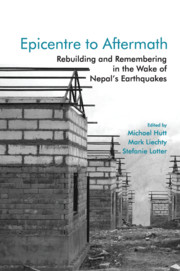10 - Reclaiming Heritage: The Politics and Poetics of Newar Urbanism
Published online by Cambridge University Press: 08 July 2021
Summary
Introduction
The reconstruction and restoration of cultural heritage sites has become a common concern following conflicts and disasters. Most conservation efforts focus on communal heritage in the form of prominent religious sites, cultural monuments, museums, and archaeological sites. In Nepal, large religious complexes and prominent cultural monuments, including the Kathmandu Valley's UNESCO World Heritage Sites, experienced extensive damage due to the earthquakes of 2015. Many historical urban settlements in the Kathmandu Valley, such as Harisiddhi, Thecho, Khokana, and Bungamati, also saw significant destruction of communal heritage. In the immediate aftermath, the importance of such heritage sites for local cultural identity and ritual practices, as well as their economic value as attractions within the tourism economy, led to urgent calls from a wide range of international and local stakeholders to repair, preserve, and rebuild these sites as a core part of the post-disaster reconstruction process. Against this backdrop, this chapter takes up the ‘household’— vis-à-vis heritage preservation—as the primary unit of analysis to focus on the historic urban landscapes in the Kathmandu Valley that include large numbers of private commercial and residential spaces and structures. The key question that the chapter addresses is this: If heritage is embodied within the layout, form, and aesthetic of private residential and commercial spaces, how do residents, NGOs, and governments prioritize cultural preservation against the need to rebuild quickly, efficiently, and safely while adhering to the norms and standards of architectural aesthetics and cultural authenticity?
The earthquake of 25 April triggered a major humanitarian response, including support from international emergency response teams, relief and reconstruction advisors, and over USD 4.1 billion pledged by international donors (National Planning Commission 2015b). In December 2015, the National Reconstruction Authority (NRA) was formed and issued a national plan for rebuilding that advocated ‘owner-driven’ reconstruction and a fair distribution of housing aid (National Planning Commission 2015a). The NRA's plan explicitly advocated the empowerment of affected persons, and their right to participate in the design, planning, and construction of their homes and commercial properties. It also promoted hazard mitigation through new seismic resistant building codes and by-laws, and the need to promote community-level economic development.
- Type
- Chapter
- Information
- Epicentre to AftermathRebuilding and Remembering in the Wake of Nepal's Earthquakes, pp. 226 - 252Publisher: Cambridge University PressPrint publication year: 2021



